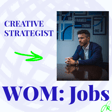Become a Creator today!Start creating today - Share your story with the world!
Start for free
00:00:00
00:00:01

Internal/External Communication Officer with Tess Lawrence
Have you ever wondered what the job of an internal/external communication officer is like? Tune in to see its connection to a Swiss Army Knife.
Host: Sonja Kamper
Guest: Tess Lawrence
Explanations:
- RSE: fr. Responsabilité Sociale des Entreprises; eng. CSR, Corporate Social Responsibility
- Dot the i's and cross the t's: pay great attention to small details
- Sarbacane: all-in-one solution for marketing communications
- Canva: graphic design platform
- Templafy: AI-powered document generation platform
- WordPress: wab content management system
- WPML: translation plugin for WordPress
- WordPress Editor: way to edit pages on WordPress
- GPT: Generative Pre-trained Transformer, ChatGPT
- PlayPlay: video editing tool
- Clipchamp: video editing tool
- Adobe Premiere Pro: video editing application
- Pardot: marketing automation solution of Salesforce = Marketing Cloud Account Engagement
- Salesforce: CRM (Customer Relationship Management) software
- Gamma: AI design partner
- Google Analytics: collects website data for reports
- SEO: Search Engine Optimisation improves website ranking on the SERP
- SERP: Search Engine Result Page
- McKinsey: global management consulting firm
Transcript
Introduction to the Podcast and Guest
00:00:00
Sonja Kamper
Servus and welcome to the World of Marketing: Jobs podcast, where I am taking you on a marketing journey of job awareness, consideration and application.
00:00:12
Sonja Kamper
And I'm so excited to welcome you to the first ever episode. And I definitely have an incredible guest with me today. Her name is Tess.
00:00:22
Sonja Kamper
Hi, Tess.
00:00:25
Tess Lawrence
Hi everyone.
00:00:27
Sonja Kamper
You are an internal external communication officer, right?
00:00:33
Tess Lawrence
That is correct.
Understanding the Role of a Communication Officer
00:00:35
Sonja Kamper
So let's jump right into some this or that question so we can better understand what we're working with. Does this sound good for you?
00:00:43
Tess Lawrence
That sounds great. Let's get into it.
00:00:46
Sonja Kamper
Perfect. So I will give you two options and you choose always the one that fits your job better. or B2C? or b two c
00:00:57
Tess Lawrence
Definitely B2B.
Working in a Large International Organization
00:01:00
Sonja Kamper
SME or large organization?
00:01:04
Tess Lawrence
Large organization. I think right now we're above 6,000 people in 17 countries.
00:01:10
Sonja Kamper
Okay, wow. So local or international is also an easy one for you then.
00:01:18
Tess Lawrence
Yeah, absolutely international.
00:01:21
Sonja Kamper
Agency or in-house?
00:01:24
Tess Lawrence
Mostly in-house, but some agency as well.
00:01:28
Sonja Kamper
Okay. Are you a full stack marketer or a specialist?
00:01:35
Tess Lawrence
Absolutely a full stack marketer. I would say kind of the Swiss army knife of the team.
00:01:42
Sonja Kamper
Sounds intriguing. So you have a small or a big team?
00:01:48
Tess Lawrence
For marketing and communications, I think it depends on how you define small or big. For us right now, we're at about 50 people, so I'd say midsize.
00:01:53
Sonja Kamper
Mm-hmm.
00:01:57
Sonja Kamper
Okay. And are you rather structured or flexible?
00:02:05
Tess Lawrence
Definitely flexible. No silos. Everyone works with everyone. We have our roles, but a lot of it is just helping each other out, support roles when we can, and working with everybody at the same time.
00:02:18
Sonja Kamper
Oh, that sounds so cool. It's always fascinating when you have like a bigger team and everyone works with everyone. So definitely interesting for your role as an internal external communication officer.
00:02:25
Tess Lawrence
Absolutely.
00:02:30
Sonja Kamper
So what slogan would you choose for your job then?
00:02:34
Tess Lawrence
One catchy phrase that would describe my job, i would say is, um I know it sounds funny, but you never know what you're going to get.
00:02:46
Tess Lawrence
Forrest Gump box of chocolates. Uh, essentially it changes every day. i think that it stays interesting. You get to work with a diverse amount of topics and teams and you need to be ready to stay flexible.
00:02:59
Tess Lawrence
You never know what's going to come up. And so as a result, um, being adaptable and quick thinking, but at the same time, knowing that you can rely on your colleagues to support you when those changes happen, I think is the, the best way. So definitely Forrest Gump life's a box chocolates. Yeah.
Dynamic Tasks and Tools for Communication
00:03:19
Sonja Kamper
Very cool. So what do you do on a daily basis? How does your job then look like? How does your box of chocolates look like?
00:03:25
Tess Lawrence
Yeah, so getting into a little bit more detail, it changes quite frequently it changes depending the year as well. quite frequently and it changes depending on the time of year as well So I am internal ah communications mostly, some external communications, and then as a side mission or task, I've been onboarded a lot onto the financial communications within the team.
00:03:51
Tess Lawrence
So depending on if there's a financial closure, either for the board of directors or for an external communication, um obviously that's going to take precedence over the other things that I do. But then on a normal day to day, it's going to be mainly focused on internal communications. And then for external, it would be like integrations through the back end of the website or publications, as well as working with teams and different consulting teams within the company, whether it be CTO, DC, sustainability, RSE, to be able to help them communicate effectively what they need to.
00:04:24
Tess Lawrence
A lot of other things include, I guess, just your standard measuring KPIs as well, making sure everything is being tracked, um drafting content. And on top of that, just kind of filling in, like I said, Swiss Army style, where where the team needs the most help. We have...
00:04:42
Tess Lawrence
A great graphic designer, we have a great videographer, we have amazing people in senior positions who are able to really take the lead on major projects and events. But what's nice is ah we get treated very, everyone gets treated almost the same, which is really great because you get a huge amount of responsibility.
00:05:01
Tess Lawrence
a lot of work, but also you get to grow very quickly and you get to pilot projects that you wouldn't normally be able to. So even though, um, you know, I don't have 10 years of experience within this company in this field, I'm still able to be a project manager for some very large events within the company and then internationally as well.
00:05:20
Tess Lawrence
Um, And then also pilot projects within different teams to be able to um kind of learn as I go the most efficient ways and the best ways to communicate, to plan, to roadmap, to work with people. um So it's really a great learning experience as well.
00:05:37
Tess Lawrence
And then for financial communications, that's where things become a lot more tedious and a lot more detail-oriented. So the biggest thing is making sure all of those T's are crossed, I's are dotted.
00:05:50
Tess Lawrence
Obviously, these are communications that are going to affect the solvency, the liquidity of the company. And so it's very important to make sure everything is double, triple checked. And since these are things that we work directly with the CEO, CFO, CMO, it's it's something that you need to have a certain kind of posture and be able to have a certain kind of um organization while running a million things in tandem.
00:06:15
Tess Lawrence
Um, so yeah, those are kind of the basics across the board, but then obviously within each, there's a lot more detail, a lot more things that go into them, but, um, that's like a good global overview, I would say.
00:06:28
Sonja Kamper
Definitely interesting. So when we go more into the specificities, ah what tools do you use on a daily basis? So if I were to be an internal external communication officer, what do I deal with every single day?
00:06:43
Tess Lawrence
Yeah, absolutely. So for us, we're more centered on Microsoft, but I know that a lot of internal communications officers are definitely on like the Google suite.
00:06:47
Sonja Kamper
hmm.
00:06:51
Tess Lawrence
So I have in other jobs had experience with, you know, Google Analytics, Dashboard, things like that for us personally and within my team. I am more focused on for internal communications, we use a tool called Sarbacan um for everything regarding newsletters and tracking of KPIs for those as well, emailing.
00:07:11
Tess Lawrence
Obviously, we use Outlook a huge amount just for scheduling meetings, sending invitations, and then... um On top of that, being able to use emailing just in terms of like formats that we use and things like that when we're sending out big communications as well, making sure everything's compressed, everything's following the best practices for ah digital consumption as well, which is a very big thing for eco-responsibility, um making sure everything follows accessibility guidelines.
00:07:38
Tess Lawrence
And tools like Sarbacan, Outlook, other ones that we use are very good for checking all of those. On top of that, I mean, it's a must, I think, for everybody nowadays, but using Canva a lot just because you need to know how to obviously create something very quickly, make it attractive, and then you can go from everything from video to static graphics. So that's really nice. I also rebrand a few white papers for the U.S. team with that, and on top of that, doing some more advertising, if that makes sense, but internally um for a couple of the teams on the US s side and the UK side.
00:08:15
Tess Lawrence
um So Canva is definitely a must. Beyond that, um PowerPoint, we use a plugin called Templify. That's really nice. That's something I think, honestly, I would recommend everyone to use.
00:08:28
Tess Lawrence
It's kind of, you have everything with your graphic charter already built into PowerPoint, into Word, into Excel. So you have templates, you have elements, assets, um and then you're also limited to a certain color scheme, which I know may sound a bit annoying, but to be very honest, when you have 6,000 people who don't necessarily know how to brand things or stay within a style or it makes it a lot easier to have consistency in your offerings across the board, which is really nice. And then for us in communications and marketing, it makes it a lot easier to explain um what we need you to do and how.
00:09:06
Tess Lawrence
Beyond that, we use a lot of WordPress. So that's for mainly things external. So that's what our website runs on. Um, Within WordPress, we have many, many plugins, a lot of translation. Since we are such an international company, everything we offer, we offer in English, French, and German.
00:09:24
Tess Lawrence
And so being able to have those very quick automated translation tools is really important for us. We use WPLM for one and then WordPress editor for another. so those are really good ones to use. Um,
00:09:36
Tess Lawrence
And beyond that, I would say that all of our internal, um they are proprietary, essentially, tools that we use. We have a sort of GPT that we use. We have legacy websites plus our new merged website for in the internet that we have.
00:09:54
Tess Lawrence
And all of these are very easily editable. They have essentially drag and drop systems, which are really nice so everyone can edit as they'd like. um And then beyond that, um just for the Swiss Army knife part of the the job, Adobe Premiere Pro, and just for video editing as well.
00:10:13
Tess Lawrence
And um beyond that, just you know things like PlayPlay, ClipChimp, things like that. But um those are the most important, I would say.
00:10:24
Sonja Kamper
So we can definitely see the Swiss army knife coming through on that one.
00:10:28
Tess Lawrence
yeah
00:10:31
Sonja Kamper
So is there anything that you would say it's not your job?
Handling Responsibilities and Team Collaboration
00:10:36
Sonja Kamper
Where colleagues come over and say like, oh, could you do that real quick? And you go like, oh no, actually someone else in my team or in any other team of your big team does cover this part.
00:10:51
Tess Lawrence
Oh man, okay, that's a really good question. I think, to be very honest, The job description you will get will never be your actual job. but It will be a good core idea of what you're going to be dealing with.
00:11:05
Tess Lawrence
um But I think it's like you said, those things that you get approached with that you're not going to actually do that actually become a big part of your job a lot of the time. For me... um ah Since, like I said, we have such a skilled graphic designer and videographer, what's really nice is a lot of the graphic design elements and a lot of the videography elements, although I do help occasionally when there is, you know, short bandwidth or there's a big thing coming up that we can't really spend the time to delegate within the team.
00:11:35
Tess Lawrence
Most of the time we pass that on to them. um They're very efficient. They know exactly what people are looking for. And obviously it's their specialty. So they are much more advanced in that domain. So those are things that if I get approached, I'll usually check in with them to see if they have the bandwidth to do that.
00:11:53
Tess Lawrence
Yeah. and The other thing is even though i'm in communications and marketing, I honestly don't handle social media almost at all. So in previous jobs, and I think for a lot of people, when they think of marketing, they think only social media.
00:12:07
Tess Lawrence
Um, for us, we, we actually have a social media team dedicated and, uh, it's one of the only teams that I haven't worked with much. Um, if we have something, obviously I'll contact them to be able to communicate it, but that's something that I would direct towards them. Absolutely.
00:12:22
Tess Lawrence
um And beyond that, there are certain things just in terms of event planning and or um things that teams from the consulting side might approach us for that actually facility management, hospitality, um and our internal planners actually can organize that a lot better.
00:12:41
Tess Lawrence
And then on top of that, there's always the The requests for solving IT t problems for some reason that comes to us. um We're the ones who get hammered with that quite often. But ah thankfully, we have a great internal IT t team who we just direct them. We say, hey you know, you can make a ticket if you'd like. and um And they're usually able to fix that. But those are the ones that I usually field pretty much anything else.
00:13:07
Tess Lawrence
um We kind of never say no, honestly. We're here to help and here to get a better understanding of how to support sales, of how to support communications. So um even if it's just to familiarize ourselves with the project, we'll usually have a preliminary meeting at least and then kind of go from there and see who's the best to to take on the project.
00:13:26
Tess Lawrence
But yeah.
00:13:29
Sonja Kamper
So you were mentioning that within marketing, you have like several other teams, you mentioned social media. So with you in internal external communication, how many other teams fall under the marketing realm in in your case then?
00:13:43
Tess Lawrence
Yeah, absolutely. So there's quite a few. ah for We're kind of broken into much smaller teams. So obviously, as you said, there's the social media team that is not very big, but very efficient.
00:13:58
Tess Lawrence
ah um And then we have the website team.
00:13:59
Sonja Kamper
Mm-hmm. Mm-hmm.
00:14:01
Tess Lawrence
So the website team is going to be everything that like revolves around publications, both internally and externally that we do, but mainly externally. um That's going to be on our website. And that goes from everything from radars, client stories, insights, ah interviews.
00:14:16
Tess Lawrence
um So we have that team as well, which I'm a part of, and I'm not like a driving force on it, but I definitely, I help with translations, technical validations, um and then integrations as well.
00:14:23
Sonja Kamper
who
00:14:28
Tess Lawrence
So we, it's composed of a lot of people that are within the bigger team, but then that also come in to help out to do those integrations. Um, Beyond that, we also have the internal communications team, which I am a big part of and a driver of in that one.
00:14:43
Tess Lawrence
ah Within the internal communications team, it's not subdivided anymore. We kind of have our own perimeters that we do take care of. So everyone has a certain sector that they're going to be responsible four for, for one-to-one relays.
00:14:54
Tess Lawrence
And then beyond that, we work together on pretty much everything and kind of tag in when someone else needs help or whatever the case may be. we also have our PR team. So PR team is going to be everything that's going to be external, everything that's going to be obviously press releases and things like that for the company.
00:15:12
Tess Lawrence
And, um, beyond the PR team, we have our financial communications team, which I am now a part of. Um, and then on top of that, it does get subdivided quite a bit.
00:15:25
Tess Lawrence
Um, and beyond that, we also have, um, ah what would I call them? I guess it would be kind of events, but not so much events as just like corporate branding, if that makes sense.
00:15:34
Sonja Kamper
Mm-hmm. Mm-hmm.
00:15:38
Tess Lawrence
So because it's corporate branding, they do a lot of events, but it's not just that.
00:15:38
Sonja Kamper
who
00:15:41
Tess Lawrence
They do a lot of communications, a lot of marketing as well um within that. And then beyond corporate branding, we also have the, I guess, traditional marketing team. So they're going to handle everything that's going to do with, we use Pardot for email communications to be able to send emails you know, awareness, offers, campaigns, everything like that to certain clients that we've either already worked with or certain that we're trying to get, trying to garner awareness.
00:16:11
Tess Lawrence
So, yeah, that's kind of the the brief overview of all the teams.
00:16:15
Sonja Kamper
Super interesting. So I think now it's time to get back to your job as an internal external communication
Skills and Adaptability in Communication Roles
00:16:22
Tess Lawrence
Mm-hmm.
00:16:22
Sonja Kamper
officer.
00:16:23
Sonja Kamper
So if you were to craft like a job persona, how would it look like?
00:16:30
Tess Lawrence
Ooh, so ah job persona. I think, and I think i I mentioned this a little bit at the start, but one of the most important things to me, I think within this job is remaining flexible and adaptable.
00:16:42
Tess Lawrence
um You need to be able to think on your feet very quickly. Obviously things happen, issues happen, short delays. And this is, I think more and more with any any job nowadays, um being flexible, being able to go Kind of, it's funny, but I think of ah improv rules where you go, yes, and, instead of saying no.
00:17:06
Tess Lawrence
So kind of that rule of going yes, and, and then continuing that conversation and continuing that solution finding instead of just saying, you know, throwing your hands up and saying, hey, you know, I have no clue what I'm doing. Yeah.
00:17:19
Tess Lawrence
I think the other thing for a persona, somebody who is ah willing to say, hey, no, I don't know that tool, but give me an hour and I'll figure it out. um Someone who's willing to be proactive, which is something that I think is missing in a lot of candidates and a lot of job personas nowadays is people just kind of go straight to their manager to ask questions instead of using the incredible, you know,
00:17:42
Tess Lawrence
platform of the internet or even AI or anything like that to be able to do a quick research and most of the answers you have you'll find. If you can't find it then obviously that's a great time to be able to go to your manager and talk to them or to another colleague within the team but taking that initiative to first research yourself I think is really key.
00:18:00
Tess Lawrence
um And then i think the third thing I would say is autonomous. So someone who can pilot things by themselves. Obviously, when you're starting out, you have probably a good six months where you're fully integrating into the team until you feel, i would say, comfortable being able to take on those responsibilities. And that's totally normal.
00:18:19
Tess Lawrence
Beyond that, being more and more confident to be able to pilot things that maybe you're uncomfortable with, um, But you've developed the right sense of which questions to ask, I think is the best thing. So you know what questions to ask at the start, you know who you can contact, you know who you can go to.
00:18:39
Tess Lawrence
And beyond that, having the confidence to say, okay, this is my responsibility, this is my project, this is my perimeter. I'm going to do the best I can to be able to facilitate this in a way that um either I can learn from if, you know, things go wrong or in a way that I'm going to make it seamless. And these are things we can integrate in the future if someone else takes over.
00:19:01
Tess Lawrence
um So, yeah, I would say mainly just being proactive, being flexible and being having the capacity to be autonomous later on.
00:19:11
Sonja Kamper
Super interesting. So I think we can narrow down now a little bit more and go towards the job value preposition. So I'm gonna give you like a little fill in the gaps exercise.
00:19:22
Tess Lawrence
and
00:19:26
Sonja Kamper
And yeah, I think we just jump right into it.
00:19:31
Sonja Kamper
A
00:19:31
Tess Lawrence
Fantastic.
00:19:33
Tess Lawrence
Internal and external communications officer.
00:19:37
Sonja Kamper
helps.
00:19:39
Tess Lawrence
ah Colleagues and external stakeholders across global teams.
00:19:44
Sonja Kamper
who want to
00:19:47
Tess Lawrence
Align on messaging, strategy, and goals.
00:19:52
Tess Lawrence
Reducing miscommunication, misunderstanding, and message inconsistency.
00:19:58
Tess Lawrence
By increasing engagement, clarity, and trust among both the internal and external stakeholders.
00:20:06
Sonja Kamper
Amazing. Oh, that sounds so interesting. I want to get right into it immediately.
00:20:13
Tess Lawrence
Okay.
00:20:14
Sonja Kamper
And I think nowadays it's also very important to look at, oh, I'm doing this job now, but future comes closer and closer. And we hear, especially with AI, that there might be some shifts in terms of communication.
00:20:24
Tess Lawrence
and
00:20:31
Sonja Kamper
capabilities we have. So what would you say are like the golden nuggets that i need to have characteristics, et cetera, to be able to do your job as an internal external communications officer also in the future?
00:20:46
Tess Lawrence
It's a good question. um I think this can be broken down into soft skills and hard skills as most things.
00:20:51
Sonja Kamper
Mm-hmm.
00:20:52
Tess Lawrence
um So soft skills being the the things that I think are going to, get you far with people and get you far within your professional posture and the way you approach situations.
00:21:05
Tess Lawrence
Hard skills being the things that are going to be honestly necessary to move forward. um As things, I think, get more and more available with communication, with, um you know, AI, with the internet, everything like that, um but mainly AI, um it's going to be more important to be able to have a really, even just a ah basic understanding of how tools function to be able to carry those conversations and know how to communicate to people. So um For me, I think the biggest future skills people would need to do the job would be having a good understanding of how to use ai when to use ai having a good understanding of data privacy, confidentiality, um understanding that open source does not meet confidential in any way, shape, or form.
00:21:56
Tess Lawrence
um And beyond that, I think the skills are... um And this is, this is kind of something that, this is kind of something that you develop over time, I think, but, um,
00:22:11
Tess Lawrence
having both the humility and the confidence to ask yourself um and ask others very important questions that you may not think are important. So having that, um quote unquote, the audacity, you know, to to put yourself out there and ask the clarifying questions that a lot of people I think are afraid to because they're afraid that they will look stupid or that someone will look down on them for it.
00:22:36
Tess Lawrence
Yeah. but something and some Something someone told me a long time ago is that, um you know, always ask that question, even if you think it's stupid, because I promise you there is someone else in the room.
00:22:48
Tess Lawrence
who is asking themselves the same and doesn't have the courage to ask it. So being willing to have that courage to ask those questions, I think is a great soft skill. Um, beyond that, I think the hard skills would be obviously a good understanding of how to prompt AI.
00:23:04
Tess Lawrence
So how to structure those kinds of prompts and how to use that and how to very carefully use the information to be able to create content, things like that, but while protecting confidentiality and anonymity, um,
00:23:17
Tess Lawrence
Other tools I think that are going to be important. Anything that has to do with generation as well. So obviously Gamma right now is not fantastic, but having an understanding of those kinds of things that are going to make your job workflow a lot faster.
00:23:30
Tess Lawrence
um I think understanding the basic suites of both Google and Microsoft. So understanding the basics of how... Google Analytics works, dashboard, everything to do with SEO as well, I think is really important.
00:23:41
Tess Lawrence
And then having the same on the Microsoft side. So whatever company, because to be honest, any company you go into is going to be using one of the two. So to be able to integrate yourself a little faster with an onboarding and I think have those backgrounds is really important.
00:23:55
Tess Lawrence
And this one, I can't stress enough. um It is baffling to me the number of people who don't know how to use basic tools like Excel. um Take a course.
00:24:06
Tess Lawrence
There's plenty. Excel is super powerful. There's a lot of plugins you can put into it. It'll make your life easier. um Just really, really learn how to use Excel and Word so that you're using not just 10% of the functionalities, but maybe 90, which is ambitious.
00:24:22
Tess Lawrence
um And then I think tools like Canva is lastly the most important. There's a lot of people, I think, who are afraid of Canva because there's a lot of options and maybe they haven't used it before. I think for people who are recently students, it's obviously more normal to have used it quite often.
00:24:38
Tess Lawrence
But if you never did that within your job, I think it's important, especially because it is replacing quite a lot of jobs. so um Making sure you're at least comfortable to know how to modify things, how to change things, how to use templates, stuff like that. I know that's a lot. You don't have to do it all within one day.
00:24:56
Tess Lawrence
um This is just over the course of when you're starting a job or a career. I think those are going to be the most important going forward. And also just knowing how to research new tools, how to stay aware how to get content that's relevant, um staying up to date, because as we know, things are changing every day, honestly.
00:25:15
Tess Lawrence
So making sure that you're up to date and in the know is very important.
00:25:20
Sonja Kamper
So what sources do use on a daily basis to stay updated?
Staying Informed and Future Questions
00:25:25
Tess Lawrence
So I have it coming from a lot of different areas. Personally, i use McKinsey, which is really great.
00:25:32
Sonja Kamper
Mm-hmm.
00:25:33
Tess Lawrence
It's an app you can get on your phone. It's a website. And it gets you up to date with some of the most important business things. They have a lot of great reports on there, both financial and not. And then they also have a lot of great reports on tools that you can use, things like that.
00:25:47
Tess Lawrence
A quick Google search can never hurt, but always take it with a grain of salt, to be very honest. um Be very careful just because We don't know what as much as misinformation nowadays.
00:25:59
Tess Lawrence
And beyond that, um funny enough, I think following certain good channels on Instagram can be really good. On LinkedIn can be really good. Social media, again, has a lot of misinformation. But I think it also, if you know the right people to follow, I think it can actually boost your knowledge quite a bit.
00:26:18
Tess Lawrence
And then for me, I also use news sites or news like apps, kind of like BBC or something like that, trying to stay away from the political but focus on maybe science innovations that have come out, computer science innovations that have begun to you know emerge, things like that.
00:26:35
Sonja Kamper
Thank you so much for going into detail what your Swiss Army knife job as an internal external communication officer all brings you on a day to day basis.
00:26:46
Sonja Kamper
And the only last thing that's left on my to do list for this interview is ah question for my next guest.
00:26:47
Tess Lawrence
and
00:26:57
Tess Lawrence
Okay. My question for the next guest would be, what was the moment you truly felt confident in doing your job?
00:27:07
Tess Lawrence
Specifically with imposter syndrome, what was that moment you really felt, hey, I've arrived? Okay.
00:27:15
Sonja Kamper
Oh, now I'm even more excited to interview my next guest bring that episode out. So thank you so much, Tess, for being part of the first ever episode of the World of Marketing Jobs podcast.
00:27:22
Tess Lawrence
Bye. Thank
00:27:27
Sonja Kamper
And I can't wait to hear more about you in the future. Thank you so much. And to those listeners, know thank you so much for listening. Bus , Baba
00:27:38
Tess Lawrence
bye thank you






